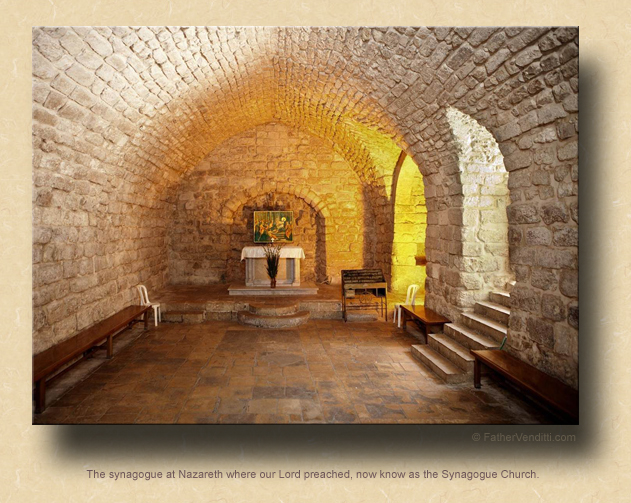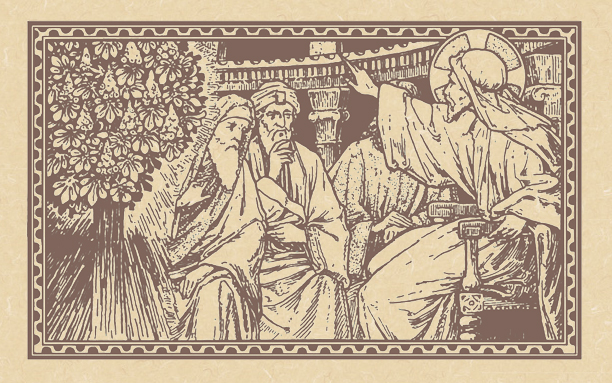Don't Put the Cart Before the Horse.
The Memorial of Saint Paul Miki & Companions.*
Lessons from the primary feria, according to the ordinary form of the Roman Rite:
• Hebrews 12: 4-7, 11-15.
• Psalm 103: 1-2, 13-14, 17-18.
• Mark 6: 1-6.
|
…or, from the proper:
• Galatians 2: 19-20.
• Psalm 126: 1-6.
• Matthew 28: 16-20.
…or, any lessons from the common of Martyrs for Several Martyrs.
|
The Third Class Feast of Saint Titus, Confessor & Bishop; and, the Commemoration of Saint Dorothy, Virgin & Martyr.**
First & Second lessons from the common "Státuit…" of a Confessor Bishop, Gospel lesson from the proper, according to the extraordinary form of the Roman Rite:
• Ecclesiasticus 44: 16-27; 45: 3-20.
• [Gradual] Ecclesiasticus 44: 16, 20.
• Luke 10: 1-9.
|
If a Mass for the commemoration is taken, lessons from the common "Me exspectavérunt…" of a Virgin Martyr:
• Ecclesiasticus 51: 13-17.
• Psalm 45: 6, 5.
• Matthew 13: 44-52.
|
FatherVenditti.com
|
1:40 PM 2/6/2019 — Today's Gospel lesson is Saint Mark's abbreviated version of what Saint Luke described for us last month just after Epiphany: our Blessed Lord's visit to His home town synagogue in Nazareth. On my web site I've included a photo of the inside of that very synagogue, which is not only preserved, but which is now a church called the Synagogue Church, and which is now the possession of the Greek Catholic mission in Jerusalem.

 Mark doesn't tell us the subject of our Lord's homily in Nazareth the way Luke did; in fact, Mark chooses instead to focus on what was only a passing reference in Luke's account: the questions raised about our Lord's origins, probably arising from the jealousy of the professional rabbis who were in attendance that day to hear our Lord preach. Mark doesn't say anything about them wanting to throw our Lord over a cliff like Luke did; instead, he mentions something much more curious. I like Monsignor Knox's translation of the line best: “It is only in his own country, in his own home, and among his own kindred, that a prophet goes unhonoured” (6: 4 Knox). It sounds all the world like he's quoting something, but no reference is given, and it's not familiar. If our Lord is quoting something He's read, it's not the Scriptures; more likely it's just a saying. The curious part is what the Evangelist tells us right after this: “So he was not able to perform any mighty deed there, apart from curing a few sick people by laying his hands on them” (v. 5 NABRE). Mark doesn't tell us the subject of our Lord's homily in Nazareth the way Luke did; in fact, Mark chooses instead to focus on what was only a passing reference in Luke's account: the questions raised about our Lord's origins, probably arising from the jealousy of the professional rabbis who were in attendance that day to hear our Lord preach. Mark doesn't say anything about them wanting to throw our Lord over a cliff like Luke did; instead, he mentions something much more curious. I like Monsignor Knox's translation of the line best: “It is only in his own country, in his own home, and among his own kindred, that a prophet goes unhonoured” (6: 4 Knox). It sounds all the world like he's quoting something, but no reference is given, and it's not familiar. If our Lord is quoting something He's read, it's not the Scriptures; more likely it's just a saying. The curious part is what the Evangelist tells us right after this: “So he was not able to perform any mighty deed there, apart from curing a few sick people by laying his hands on them” (v. 5 NABRE).
Scripture scholars debate at great length whether the “mighty deeds” being referenced are miracles—the Greek word Mark uses is δύναμιν, which means exactly as it's given here: “mighty deed”—but, since we know our Lord has already performed some at this point, they probably are. What's interesting is Mark's suggestion that He's not able to perform any because they won't honor Him. Our Lord's miracles—with the exception of the raising of Lazarus—are not meant to prove to anyone who He is or bring people to faith, but rather are rewards for having made an act of faith. They didn't make one in Nazareth, so He didn't do any … except for one: He cured their sick.
It's totally unclear why He makes this exception. Probably it's because the sick are that way through no fault of their own, which, you'll recall, is consistent with our Lord's challenge to the Semitic notion that illness is the result of sin. And, as you know, throughout all the Scriptures illness is an analogy for sin. It's the reason that the sacrament of confession is the only sacrament you don't have to be in the State of Grace to receive.
What I would like you to reflect upon today is the fact that our Blessed Lord did no miracles for his adopted home town because of their lack of faith in Him, which is important to remember during those times when we find ourselves in the midst of some sort of dark night. The act of faith and hope must come first.

* Born in 1597, Paul Miki was a Japanese Jesuit martyred along with 25 companions in Nagasaki. They were the first martyrs of East Asia to be canonized, hung on crosses and then stabbed with spears. Their executioners were astonished upon seeing their joy at being murdered in like manner to our Lord.
** The recipient of one of St. Paul's epistles, Titus was the Bishop of Crete and one of the Apostle's most faithful disciples. He died in the year 101.
Dorothy of Cæsarea in Cappadocia was beheaded at the end of the third century, in the year 275.
|

